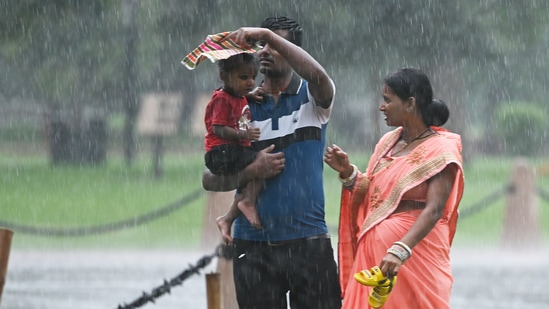
Monsoon season health guide: Expert tips on managing viral fever and infections during rainy season
8 months ago | 89 Views
Seasonal weather changes can affect every person differently because while some people have good immunity and can tide over seasonal changes without any health implications, others suffer from viral fevers and other health-related complications. The monsoon season in India generally occurs between June and August, depending on the region and this season can cause a host of airborne, water-borne and vector-borne diseases called viral infections.
In an interview with HT Lifestye, Dr Paritosh Baghel, Senior Consultant -Internal Medicine at SL Raheja Hospital in Mahim, shared that viral infections occurring during monsoon can be clubbed into various groups, depending on how they spread -
- Airborne viral infections include common cold, influenza and viral flu.
- Water-borne viral infections which include viral gastroenteritis and diarrhea
- Vector-borne viral infections, which include chikungunya and dengue
Dr Paritosh Baghel revealed, “As the name shows, viral infections are infections caused by various types of viruses. Viruses can affect any organ system of our body like the respiratory tract, gastrointestinal tract, heart, nervous system etc. During monsoons, one common viral infection is fever. Most times, the temperature of the human body is 98.6°F or 37°C. If the temperature increases even a degree above, it is a fever. Fevers often signify that the human body is trying to fight off bacterial or viral infection.”
What are the symptoms of viral fever?
Dr Paritosh Baghel explained, “Since the monsoon follows summers, there is a sudden dip in the temperature, which results in a surge of viral infection among the general population. This viral infection generally affects the respiratory tract, including the nose, sinuses, throat, and lungs. In most cases, the infection spreads from one person to another by droplet transmission. When an infected person coughs, yawns, sneezes or even talks, they spray small particles of fluids (droplets) which contain the viruses. If an uninfected person stands close to them, the virus can enter their body via the nose or mouth, causing them to become infected. Once infected, it would take about 16 to 48 hours to turn into a full-blown infection.”
He elaborated, “Some symptoms of viral fever include chills, sweating, dehydration, headache, muscle aches and pains, a feeling of weakness and loss of appetite. Sometimes symptoms are vague and can take time to debilitate a person completely. The best way to diagnose a fever at home is to check the person’s temperature with the help of a thermometer. If fever exists, it is best that the person consults a specialist at the earliest to ascertain the diagnosis and start treatment.”
How is a viral fever treated?
According to Dr Paritosh Baghel, viral fever is a common condition and people can generally recover at home unless the illness becomes severe and requires hospital admission. Some common ways to help a person can receive relief from their symptoms include -
- Take over-the-counter fever medicines like disprin or crocin. However, these medicines should be taken after a doctor’s recommendation, mainly if they involve children.
- Give your body sufficient rest and sleep.
- Drink enough fluids to stay hydrated, as dehydration in this situation can be dangerous.
- Take a lukewarm bath to reduce body temperature.
How can viral fever be prevented?
Although viral fever and infections are common, especially in the monsoon season, simple precautions can go a long way in helping to prevent them. Dr Paritosh Baghel suggested some tips to prevent viral infections and fever -
- Maintain personal hygiene by washing hands with soap or sanitising them with hand rubs, especially when you come from outside.
- Maintain cleanliness in your home and surroundings.
- If you know a person is infected, avoid any communication with them.
- Do not touch your nose and mouth frequently, especially when outdoors.
- When you cough/sneeze, always cover your mouth and nose. If you feel sick and have a fever, avoid going to public places to prevent the spreading of the disease.
- Maintain good immunity and remain healthy by having well-balanced and nutritious food.
- Exercise regularly, drink plenty of water and sleep for at least eight hours every night.
Read Also: Is it possible to get pregnant from precum?
#




















